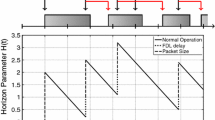Abstract
The absolute Quality of Service (QoS)model in Optical Burst Switching (OBS)aims to give worst-case quantitative loss guaratees to traffic classes. For example, if a traffic class is guaranteed to experience no more than 0.1% loss rate per hop, the loss rate of 0.1% is referred to as the absolute threshold of that class. This kind of QoS guarantee calls for different QoS differentiation mechanisms than those intended for the relative QoS model in the previous chapter. A common characteristic of these absolute QoS mechanisms is that they differentiate traffic based on the classes’ absolute thresholds instead of their relative priorities. That is, traffic of a class will get increasingly favourable treatment as its loss rate gets closer to the predefined threshold. In this way, the absolute thresholds of the classes will be preserved.
Access this chapter
Tax calculation will be finalised at checkout
Purchases are for personal use only
Preview
Unable to display preview. Download preview PDF.
Similar content being viewed by others
References
Y. Chen, M. Hamdi, and D. Tsang, “Proportional QoS over OBS Networks,” in Proc. IEEE Globecom, 2001, pp. 1510–1514.
Q. Zhang, V. M. Vokkarane, J. Jue, and B. Chen, “Absolute QoS Differentiation in Optical Burst-Switched Networks,” IEEE Journal on Selected Areas in Communications, vol. 22, no. 9, pp. 1781–1795, 2004.
M. H. Phùng, K. C. Chua, G. Mohan, M. Motani, and T. C. Wong, “A Preemptive Differentiation Scheme for Absolute Loss Guarantees in OBS Networks,” in Proc. IASTED International Conference on Optical Communication Systems and Networks, 2004, pp. 876–881.
M. H. Phùng, K. C. Chua, G. Mohan, M. Motani, and T. C. Wong, “An Absolute QoS Framework for Loss Guarantees in OBS Networks,” IEEE Transactions on Communications, 2006, to appear.
H. Øverby and N. Stol, “Providing Absolute QoS in Asynchronous Bufferless Optical Packet/Burst Switched Networks with the Adaptive Preemptive Drop Policy,” Computer Communications, vol. 28, no. 9, pp. 1038–1049, 2005.
X. Guan, I. L.-J. Thng, Y. Jiang, and H. Li, “Providing Absolute QoS through Virtual Channel Reservation in Optical Burst Switching Networks,” Computer Communications, vol. 28, no. 9, pp. 967–986, 2005.
Rights and permissions
Copyright information
© 2007 Springer Science+Business Media, LLC
About this chapter
Cite this chapter
(2007). Absolute QoS Differentiation. In: Quality of Service in Optical Burst Switched Networks. Optical Networks. Springer, Boston, MA. https://doi.org/10.1007/978-0-387-47647-6_4
Download citation
DOI: https://doi.org/10.1007/978-0-387-47647-6_4
Publisher Name: Springer, Boston, MA
Print ISBN: 978-0-387-34160-6
Online ISBN: 978-0-387-47647-6
eBook Packages: EngineeringEngineering (R0)




